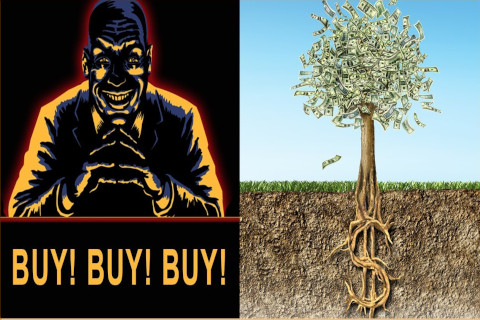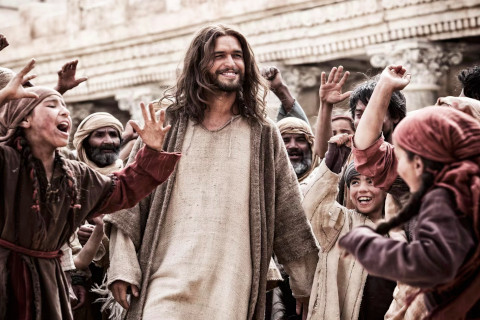Site last updated on February 20th, 2026.
Site last updated on February 20th, 2026.
Click on the quote below to read the article...
Jesus and Money
The fundamentals of our faith are to be found in the fifty articles contained on this page. They start with several articles about the Jesus whom we serve, lead to articles about money in general and living by faith in particular, and finish with some "disciples only" material discussing God's love for the poor, and how one manages finances while living our unusual lifestyle.





An excellent overview of a number of issues, linking Jesus, Solomon, and Bible prophecy through the theme of a search for supernatural wisdom.




Cherry covers some of the subtle differences between a political platform based on environmental/freegan issues and the position we take as Christians with similar concerns.





This article ties together freeganism and Bible prophecy, using the teachings of Jesus as the link between the two.





Dave identifies half a dozen false Jesuses in response to the "WWJD?" ("What would Jesus do?") question now being asked of many church young people. He notes the good points in some of these "false Jesuses", but challenges their worth in solving eternal problems.
(See also So, Who ARE They Following?, and Which Christ are You Following? part 4)





An obscure verse in the book of Acts may be more widely known than John 3:16. Though it is rarely taught publicly, it is preached privately in every denomination and sect that we know of.
(See also Advanced Tentmaking, and Which Christ are You Following? part 4)





This could just as easily be included under the Inspirational heading. It focuses on the wonderful blessing of contentment, and how it is the key to an abundant, full, and happy life... true prosperity, in contrast to the miserable existence of always looking for something better.





Terms like Jesus, the Holy Spirit, the teachings of Jesus, and the Word of God are almost interchangeable. The teachings of Jesus are central, even with regard to what happened on the Day of Pentecost.
(See also Father and Son, The Holy Spirit, and Which Christ are You Following? part 4)





We consider the possibility that translators erred in saying that greed is the root cause of all evil. Then we examine the teachings of Jesus on the subject, and even relate greed to prophecies about the personification of evil.
(See also The Root of All Evil, Don't Take the Mark, and A Unique Teaching.)
The following article comes from The Guardian (21 March, 2016). I felt it was worth pasting here, as it does not express the usual fears about mind control, etc. which so many conspiracy theorists become obsessed with, but it does deal more with the mechanics through which a corrupt world government (such as that predicted in the Bible) will be able to use the cashless society to oppress the world. --Dave




What is a Christian? And why do we call ourselves Jesus Christians? A simple statement of belief in Jesus Christ has powerful implications.
(See also A Change of Name, Which Christ are You Following? part 4, Judgment Day, So, Who ARE They Following?, The Word of God, and What is a Christian?)




These articles were originally sent anonymously to an Internet mailing list. The series examines the general subject of false christs and false teachings, and considers the possibility that the greatest potential for deception does not rest with bizarre cults so much as it does with a falling away within the institutional church.
(See also We Believe in Jesus Christ, So, Who ARE They Following? and What is a Christian?)




This is a boast in the face of cult-busters, that the criticisms they make of us personally have not even begun to scratch the surface of our impenetrable position with regard to the teachings of Jesus. As Jesus himself promised us, if we build on his teachings, the storms of persecution will not shake our foundation.
(See also We Believe in Jesus Christ.)




You will stay economic slaves as long as you think you cannot live without money. What we cannot live without is God. Trust him and you can thumb your nose at poverty.
(See A New Economic Policy, and The Greed Tree.)




Real faith is so simple that most people stumble over it in their quest for something complex and ritualistic. Real faith changes people; but real faith in Jesus is almost non-existent today.
(See also The Top Forty.)



Dave wrote this while in prison, in March, 2001. He shared it with his cell mates, who were full of religious cliches, but short on real faith. The only kind of faith that can save people, is faith in Jesus. Don't fall for some pious sounding, but lesser object of faith. An excellent "salvation" tract.
(See also False Christs, and So, Who ARE They Following?)



This brief article lists some of the trademarks of a false prophet, which we need to know in these last days. It includes some specific reference to Billy Graham.
(See also False Christs.)



Good points in two different approaches to salvation are acknowledged... with warnings not to use either to deny the teachings of Jesus.
(See also Water Baptism, and How to be Saved.)



This line from The Lord’s Prayer is examined in the light of the wealth that most of us have experienced as part of the developed world. Do we really need to pray for “daily” bread at all, when the poorest in our midst are the ones most suffering from obesity?



From the Just Do It tract. No other religion promises material provision to any who will spend their lives working for God and love. Jesus takes religion out of the realm of theory and into practical reality. This teaching led to his death, and will feature in future world events.
(See also Wisdom, Why Did They Kill Jesus? and Living by Faith.)



Deals with relationships between 'tentmakers' and 'faith' ministries.
(See also The Tentmaking Myth.)



What Jesus taught represented a threat to the status quo of his day... but only because they had lost sight of God and Truth and Love. They had become defensive of their institutions and their own sinfulness. Can you hear the truth, without reacting in hate and fear?
(See also Peace that Disturbs, and Why Did They Kill Jesus?)


Are Christians respectable, popular, socially acceptable good guys? Or are they radical, dangerous, exclusive deviants? Read this one for a few surprises.
(See also Thou Shalt Judge, Cannibals for Christ, False Christs, and The Social Conscience, part 2.)

 Rob takes a brief look at the amount of money that George W. Bush recommended giving to the banks in the U.S. to overcome the "economic crisis" and considers just how much it is costing the entire world's population to fund that little act of charity.
Rob takes a brief look at the amount of money that George W. Bush recommended giving to the banks in the U.S. to overcome the "economic crisis" and considers just how much it is costing the entire world's population to fund that little act of charity.


In the tug of war between God and Money, the role of other people (especially family and friends) often becomes the focus when shifting from one master to the other, whether it really is the motivation or not.


The system has nothing to equal sacrificial love, and so jealousy will drive it to do horrendous things to stop those who have such love. It happened to Jesus, and it will happen to us if we are faithful.
(See also Peace that Disturbs, The Cross, Jesus the Revolutionary, The Blood of the Lamb, and Prophets, Martyrs and Saints.)


Is there a difference between the way we should view the rules that Jesus gave, and the way we should view the rules Moses gave? Do the rules set out by Jesus contradict God's grace? Or are they, like the laws of Moses, 'holy'?
(See also The Top Forty, Giving to Those Who Ask, and So, Who ARE They Following?)


This is an abridged version of one of our most popular tracts (A New Economic Policy). Basically, it says that greed is destroying the world, and we need a new motivation to reverse the trend.
(See also Wisdom, and Surely, Not All Evils!)


If you learn this principle, you can usually diagnose your own spiritual problems. Just locate what it is that you are hanging onto so tightly, and let go of it.
(See also Let Go and Let God Do It!, and Fanatical Sacrifice.)


An article on indebtedness-how it gets started and how to escape it. Drastic problems require drastic solutions, and indebtedness is a drastic problem. It sucks the spiritual life out of the present, by forcing you to put your life on hold.
(See also Liberated Poverty, Part 1, Liberated Poverty, Part 2 (Clutter), and Fear of Poverty.)

Ross discusses the dilemma that Christians are put in if they take the teachings of Jesus, where it is even difficult to get donations for charitable work, because the work must be kept secret.

Simon compares real wealth with material abundance to see which one comes out on top.

Some like the teachings, but not the Man. Others like the Man but not the teachings. Unless we accept both - the man and the teachings - we are hypocrites.
(See also Belly Dancers.)

For many years we just called ourselves Christians. But because our Christ was being confused with the false christs, we decided to be more specific.
(See also Which Christ are You Following? part 4 and What is a Christian?)

Are you wasting spiritual energy attacking the fruits of evil, when you should be attacking the root cause of it all?
(See also The Root of All Evil, and Surely, Not All Evils!)

This article traces the connection between greed and idolatry, and shows where it is all leading.
(See also The Xmas Spirit, A New Economic Policy, and Don't Take the Mark.)

Ever wonder what it is like living in a Christian community like ours, where there is no private ownership, we have to co-operate with everyone else in all of our plans and activities, and where we all live each day by faith, in obedience to god? It may be more fun than you imagine.
(See also The Cure for Cancer, and Smile, God Loves You!)

The dark side of human nature can be seen most easily in the poor. Yet it is ugliest in the rich. If we see how callously evil we in the West are in relation to the Third World, it will be easier for us to love the unlovely in those countries.
(See also The Problem with the Poor, and More on the Poor.)

It's easy to know what God's will is; but only when you are willing to conform to it. If you don't want to do what you know you should do, you'll find a hundred excuses to put off obeying him. But it isn't because you don't know what you should be doing.
(See also Resolutions, The Fates, and Willing To Be Made Willing?.)
Apr 25, 2020
Something I posted recently on Quora about the new corona virus pandemic:
When will humans realize they must cancel economy and end trade to save both their lives and ignore economy and money since they are no longer important during a pandemic?
It is sad, but totally predictable, that people would find this question to be unreasonable. Perhaps it could have been better worded, but the choice really has been, and still is, between money and people.
Something I posted recently on Quora about the new corona virus pandemic:
When will humans realize they must cancel economy and end trade to save both their lives and ignore economy and money since they are no longer important during a pandemic?
It is sad, but totally predictable, that people would find this question to be unreasonable. Perhaps it could have been better worded, but the choice really has been, and still is, between money and people.
A train ride past the Kibera slums in Nairobi leads Dave to think about the need for practical demonstrations of love as opposed to theological correctness. Includes a statement from the U.S. Conference of the World Council of Churches.
This gives a bit more detailed explanation about what is really happening when we ask people for a donation, and how we try to balance our evangelical thrust with our concern for the practical needs of the people to whom we minister.
Following Roland's release from custody in Kenya, Dave discusses corruption in the prison system there and how it mirrors corruption worldwide. We cannot change the world until we deal with the root of all evil in ourselves. In particular, we need to fix our hope on an eternal kingdom in preference to any political solution.
Christine takes a cynical look at what is going on in the minds of so many people when they are doing their Christmas shopping.
You will notice that there are no stars on this article. The article is interesting, well written, and relevant to anyone who has ever asked for something in prayer and not received it. However, it does not provide an answer... just a warning. Still, there is a lot of good food for thought if you have ever wrestled with unanswered prayers. (Oh, and if you read it, do take time to read the one that follows: "Is It Really Dangerous?")
A follow-up to "The Most Dangerous Verse in the Bible", in which "Graduate A" challenges the points raised in the article below.
We all like the "fruit" of self-discipline; but few are willing to be disciplined to get it. Many non-Christians like our teachings, but still choke at the thought of committing their lives to Jesus... the source of those teachings. If the fruit is good, then you need to respect the tree.
(See also A New Economic Policy.)
(See also A New Economic Policy.)
A personal relationship with Christ is vital for each of us; but too often the phrase is a shallow cliche, used by people who rarely ever sit at his feet and listen to what he has to say.
(See also So, Who ARE They Following? and The Martha Syndrome.)
(See also So, Who ARE They Following? and The Martha Syndrome.)
A brief summary of the revolutionary nature of the kingdom that Jesus came to build.
(See also The Kingdom of Heaven or Religion?, A New Economic Policy, and Christian Politicians?)
(See also The Kingdom of Heaven or Religion?, A New Economic Policy, and Christian Politicians?)
Our shortest article. Tells how Jesus answered the title question.
(See also The Good Hindu, and Solid as a Rock.)
(See also The Good Hindu, and Solid as a Rock.)
We Jesus Christians have a special calling to point the world back to the teachings of Jesus. It is tempting to get sidetracked onto lesser goals which naturally spring out of our service to Jesus. But we must be constantly reminded to return to the basics.
(See also Solid as a Rock, and The Top Forty.)
(See also Solid as a Rock, and The Top Forty.)
This Bible study was prepared for distribution outside a youth meeting in Sydney, which had the same theme (i.e. God and Money). Here is a brief, but comprehensive overview of what the Bible teaches about money.
(See also I-Dollar-Tree and The Root of All Evil.)
(See also I-Dollar-Tree and The Root of All Evil.)
Esau sold his birthright for a bowl of soup. We've seen people forfeit their part in the kingdom of heaven for even less. Like Esau, they think only of their immediate needs; and lose sight of the eternal.
(See also Pictures that Bring Perspective, True Greatness, Aim for the Sky, and Eternity.)
(See also Pictures that Bring Perspective, True Greatness, Aim for the Sky, and Eternity.)
It's a myth that we need money first before we can change the world. Such an attitude amounts to failure before you even begin.
(See also Fear of Poverty, The Greed Tree, and Jesus the Revolutionary.)
(See also Fear of Poverty, The Greed Tree, and Jesus the Revolutionary.)
Greed, pride, lust, and other vices are what lead people to being ripped off. There are many who will forsake all for selfish reasons (and get ripped off in the process), but very few will do it for God. How tragic, when you consider that only God can produce the goods and give us true happiness.
(See also The Cure for Cancer, and Smile, God Loves You!.)
There is very little giving that is done without some strings attached. True Christian character comes when we give freely, secretly, and with nothing in it for ourselves.
(See also The Donor, Rip-Off Merchants, and Pleading Poverty.)
(See also The Donor, Rip-Off Merchants, and Pleading Poverty.)
Christianity today is associated with the upper classes; yet these verses show that this is inconsistent with the teachings of Jesus.
Do not confuse financial irresponsibility with great faith. Learn the principles of God's provision and how you can help to support new disciples and bases in poorer countries until they can support themselves. Learn why we started distributing tracts, and the scriptural basis for asking for donations.
(See also Accountability, Financial Responsibility, My 2 Cents Worth, 'Conscience' Issues, and How Do You Get Your Money?)
(See also Accountability, Financial Responsibility, My 2 Cents Worth, 'Conscience' Issues, and How Do You Get Your Money?)
Some of us experience unwarranted condemnation when we receive money for doing something as spiritual as preaching the gospel. Open your eyes and look at the ways that God has chosen to meet our needs.
(See also Laziness, and Living by Faith -- How to Do It.)
(See also Laziness, and Living by Faith -- How to Do It.)
Abuses occur if community members set standards for leaders that they have never practised themselves. Issuing pocket money has enabled members to discipline themselves in areas where they formerly just criticised the community.
(See Living by Faith and Finances, part 2, and 'Conscience' Issues.)
(See Living by Faith and Finances, part 2, and 'Conscience' Issues.)
If it is blessed to be poor, then why try to help the poor to become rich? The answer is that we want to give them a choice. To be poor in spirit means choosing to be poor when you could be rich. Helping those who have no choice gives them that option.
(See also Laziness, and Bearing Burdens.)
(See also Laziness, and Bearing Burdens.)


































































